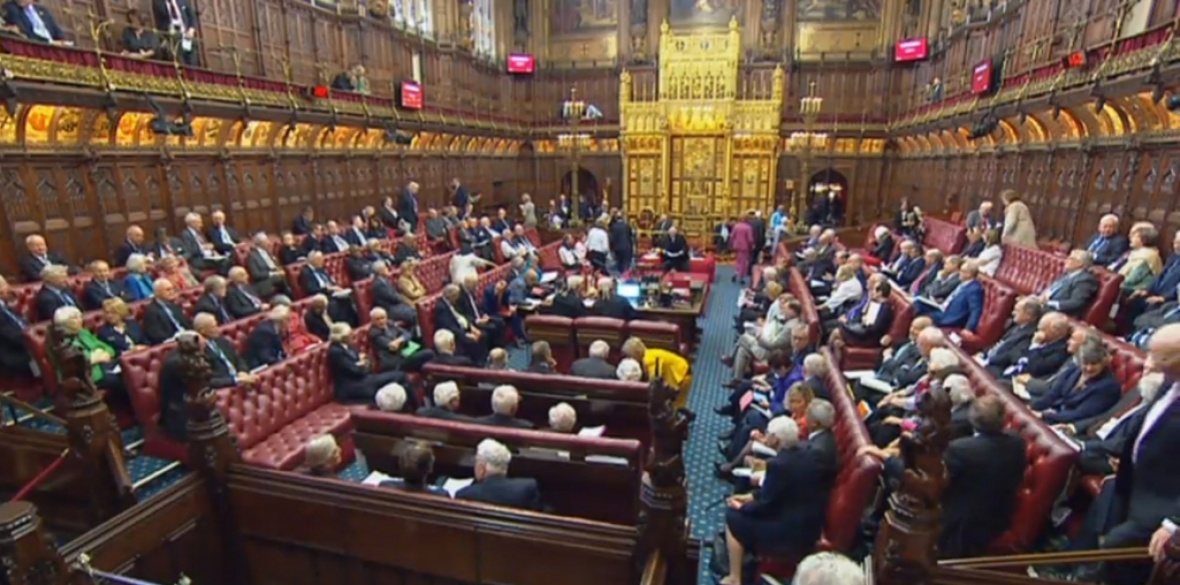This is the last article you can read this month
You can read more article this month
You can read more articles this month
Sorry your limit is up for this month
Reset on:
Please help support the Morning Star by subscribing here
IN THE clamour of the Commons Brexit debate yesterday, the word “democracy” rang out through the hall (that word was said nearly 30 times). Yet just down the corridor, a undemocratic disaster was taking place.
While elected MPs debated Britain’s future, the results came out for the latest in a series of bizarre House of Lords “by-elections.”
The vote — to fill the vacant seat following the death of Viscount Slim — saw just 28 votes cast. The only people who could vote were aristocrats who currently sit as cross-bench hereditary peers.
And the winner? With a massive 18 votes, Daniel Mosley — the 4th Baron Ravensdale and great-grandson of Oswald Mosley — stormed to victory.
At 36, he will become the youngest peer sitting in the House of Lords, and could potentially sit in the house for the next half a century.
He’ll also be able to claim his £305-tax-free expenses a day with no public accountability. The nuclear projects boss joins 90-odd other aristocrats with guaranteed representation in the “upper” house. You’re right to be livid.
Remember — this isn’t a ceremonial post. Mosley could have a huge sway over the legislation and issues that affect our country.
The average number of votes for a by-election in the House of Commons is 28,823 according to the Electoral Reform Society — 1,000 times more than the 28 cast in this contest.
We talk about deadlock when it comes to Brexit. But there is a blocking force in the Lords: despite there being almost no defenders of the absurd hereditary system, a Bill attempting to end the archaic practice of electing hereditary peers by Labour’s Lord Grocott was talked out of the Lords earlier this month.
It was blocked by dozens of wrecking amendments, tabled by just a handful of hereditary peers, to stop the reforms from being heard.
While elected MPs seize control of the Brexit debate, let’s not forget that whatever happens, an unelected clique will continue to sway our laws in the House of Lords.
For all the talk of kicking out an “unelected elite,” there is one much closer to home making a mockery of our democracy. Aristocrats continuing to rule — and voters continuing to lose out.
Imagine the powerful signal it would send for a progressive government’s first act to be clearing out this unelected cadre, and replacing it with a fairly elected house of the nations and regions. A people’s revising chamber that can represent the whole of the UK.
Thankfully, serious proposals for change have reached the top of the Labour Party. Last year Baroness (Pauline) Bryan of Partick was appointed to the House of Lords by Jeremy Corbyn, on condition of campaigning for abolition and replacement of the second chamber.
At Scottish Labour conference this month, she presented her first proposals for a pro-democracy overhaul of Britain’s crumbling constitution.
The “Bryan paper” — a breakthrough in Labour’s constitutional thinking — argues Labour must embrace “progressive federalism” under a clear, codified constitution for the UK.
It proposes a “partnership model” between Westminster and Scotland, supported by a “most likely” elected senate of the nations and regions.
That language is crucial: while Labour’s 2017 manifesto supported the “principle” of an elected Lords, it proposed mostly piecemeal reforms.
Now the party is moving in the right direction: to a genuine turn against unaccountable power.
Campaigners including Politics for the Many and Scottish Labour figures like Neil Findlay MSP have deemed the proposals a breakthrough, moving Labour closer to backing a fairly elected second chamber.
One thing unites this country right now: disdain for a broken politics in Parliament.
That’s why Politics for the Many is working to end the farce of unaccountable Lords — and build support in our movement for a new, proportionally elected chamber that we can be truly proud of.
Make no mistake: the Lords will try all means necessary to block a genuinely radical agenda. That’s why real democratic change has to be the start of a socialist programme for government: to throw down the gauntlet, and inspire voters that we are serious about reforming a broken Westminster politics.
It would be popular too: recently released BMG research polling for the Electoral Reform Society shows what a vote winner overhauling Parliament’s private members’ club could be.
Support for replacing the Lords with an elected revising chamber, by party, sits at: 67 per cent for Labour voters, 65 per cent for Conservatives, 63 per cent for Lib Dems, and even higher for Ukip (73 per cent) and the SNP (71 per cent). This is a powerful coalition — and one that could take on unelected power.
Let’s get serious about building a Parliament for the many, not the few.
Nancy Platts is co-ordinator of Politics For The Many, the trade union campaign for real democracy. She is former trade union adviser to Jeremy Corbyn.











